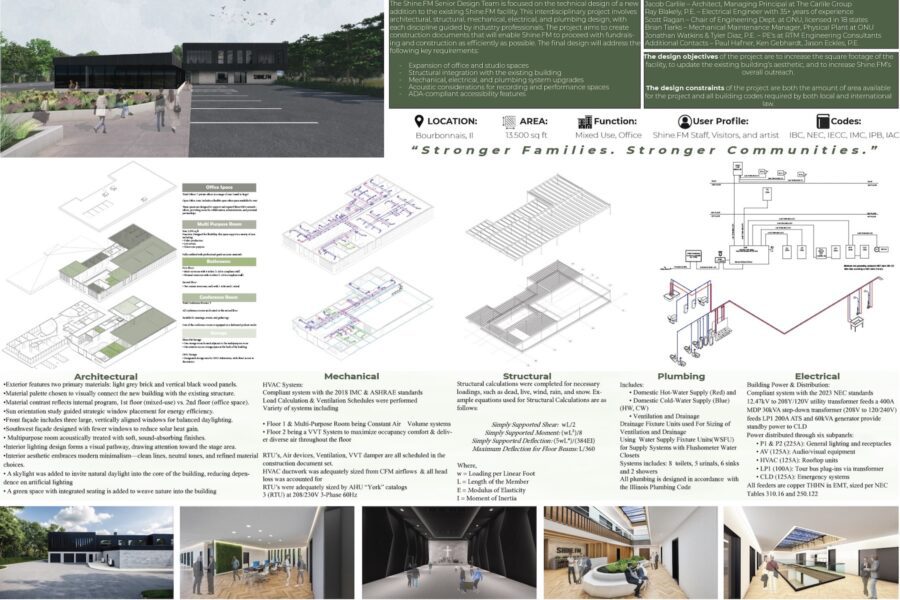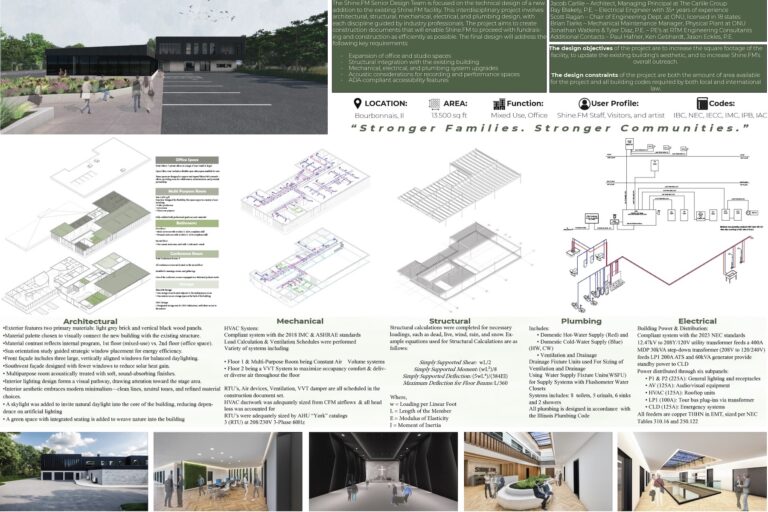
This summer, Olivet Nazarene University was one of seven universities awarded $10,000 by the National Council of Examiners for Engineering and Surveying (NCEES) for the organization’s annual Engineering and Surveying Education Award. This NCEES Award recognizes top engineering talent being cultivated in universities across the United States.
At Olivet, engineering students in the Walker School of STEM are divided into groups to collaborate on a design project during their senior year. The purpose of the senior design course is to give students a smooth transition from understanding theory and knowledge to applying those concepts to actual projects and challenges. In this capstone course, students receive guidance from faculty mentors, but are largely responsible for the planning, preparation, execution and analysis of the projects.
“A real-world project challenges students to consider the end user in a way that a theoretical project cannot by requiring the consideration of client needs, time constraints and buildability,” says associate professor and department chair, Q. Scott Ragan, P.E., S.E. “Students also learn to communicate with the ‘real world’ — preparing them for their future engineering careers.”
Two years ago, Brian Utter ’91, the executive director of Olivet Media Group, contacted the Department of Engineering with a request to create a preliminary set of construction plans for desired changes to the building that houses the on-campus radio station, Shine.FM. The intention behind the project was to create designs that would renovate the existing building while also adding office space and production spaces (for both audio and visual projects), as well as creating a rental office/lease space for other local ministries. Five Olivet students, Lucas Eckles, Kaitlyn Kolb, Anthony Lopez, Bas De Vries and Emily Neel, were selected by professor Ragan to collaborate on the plans.
Typically, senior design projects combine the efforts of students who are focused on the same engineering discipline — mechanical, electrical, architectural, structural, plumbing/fire protection, etc. This project was unique in that each student came into the project with internship experience in a different particular lane, as well as professional engineering contacts to help collaborate on the design plans. Mentor engagement included weekly project meetings, discipline-specific technical reviews and milestone submittal evaluations.
“I learned how to work productively across disciplines, especially with mechanical engineering, since our systems often overlapped,” reflects Lucas. “Coordinating electrical needs with HVAC and building layout taught me the importance of timing, sequencing and clear communication.
Working alongside two professional engineers with over 50 years of combined experience made a huge impact. Their mentorship helped me understand how professionals approach design decisions, code compliance and project documentation.”
Instead of focusing on one particular aspect of the construction plans, the team was able to develop an almost fully comprehensive set of plans that can be utilized by a professional firm once the project is funded and greenlit. This type of research and planning, usually done by a design firm, often costs between $40,000-70,000 depending on the scope of the project. In addition to consulting help from the students’ engineering contacts, the project benefitted from the expertise of local architectural engineer Jacob Carlile, from Manteno-based Carlile Group.
“Working mainly with the licensed architect and a structural engineer brought a level of realism and accountability to the project that I wouldn’t have experienced otherwise,” Bas says. “They provided constructive feedback, industry insights and practical expectations that helped us bridge the gap between academic theory and professional practice.”
This is the third time in four years that a project from the Walker School of STEM has been a finalist (2022, 2023, 2025). In 2024, the project from Olivet was the only project that received an “honorable mention” from the organization. NCEES typically receives 20-40 submissions for the award annually, indicating that Olivet’s consistent recognition alongside other premier institutions like the University of Nebraska-Lincoln, Dartmouth College, Lawrence Technical University and the University of Wisconsin-Madison is a testament to the University’s well-rounded curriculum.
“Students are required to complete the senior design course, but submitting the project to the NCEES Award demonstrates the team’s willingness to go the extra mile,” says professor Ragan. “To be considered for the award, the students had to create a poster board, write an abstract and put together a seven-page project description. Those all sound simple, but they are actually very involved steps. The fact that we received recognition again shows that Olivet is competing well with other prestigious universities.”
As there are no requirements by NCEES for the disbursement of the award money, the Walker School of STEM awarded $1,000 to each of the students involved in the project and retained the remainder within the department to supplement funding for other senior projects.
For more information about the NCEES Award, visit ncees.org/outreach/education-awards.
For more information about the Walker School of STEM, visit Olivet.edu/Academics.





